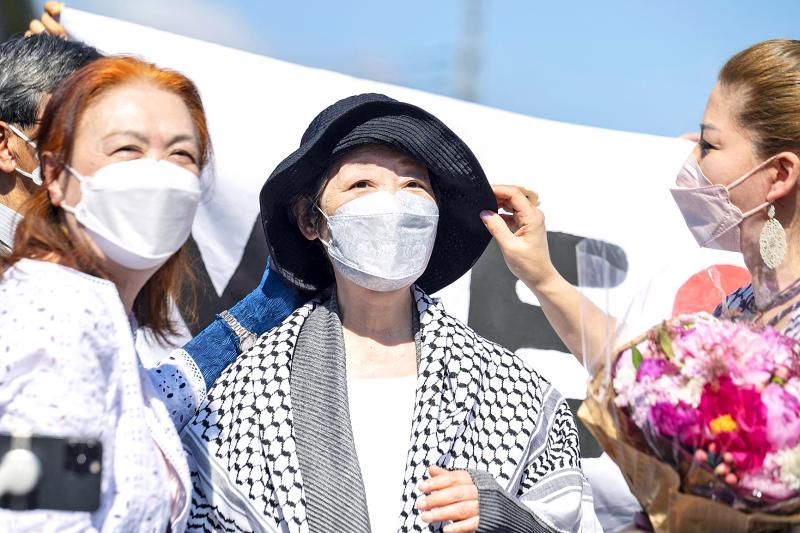Fusako Shigenobu, the 76-year-old female founder of the once-feared Japanese Red Army, yesterday walked free from prison after completing a 20-year sentence for a 1974 embassy siege.
Shigenobu was one of the world’s most notorious women in the 1970s and 1980s, when her radical leftist group carried out armed attacks worldwide in support of the Palestinian cause.
Shigenobu left the prison in Tokyo in a black car with her daughter, while several supporters held a banner saying “We love Fusako.”

Photo: AFP
“I apologize for the inconvenience my arrest has caused to so many people,” Shigenobu told reporters after her release.
“It’s half a century ago ... but we caused damage to innocent people who were strangers to us by prioritizing our battle, such as by hostage-taking,” she said.
She is believed to have masterminded the 1972 machine gun and grenade attack on Tel Aviv’s Lod Airport, which left 26 people dead and about 80 injured.
The former soy-sauce company worker turned militant was arrested in Japan in 2000 and sentenced to two decades behind bars six years later for her part in a siege of the French embassy in the Netherlands.
She had lived as a fugitive in the Middle East for about 30 years before resurfacing in Japan.
Shigenobu’s daughter May, born in 1973 to a father from the militant Popular Front for the Liberation of Palestine (PFLP), hailed her mother’s release on social media.
Shigenobu maintained her innocence over the siege, in which three Red Army militants stormed into the French embassy, taking the ambassador and 10 other staff hostage for 100 hours.
Two police officers were shot and seriously wounded. France ended the standoff by freeing a jailed Red Army guerrilla, who flew off with the hostage-takers in a plane to Syria.
Shigenobu did not take part in the attack personally, but the court said she coordinated the operation with the PFLP.
Born into poverty in post-war Tokyo, Shigenobu was the daughter of a World War II major who became a grocer after Japan’s defeat.
Her odyssey into Middle Eastern extremism began by accident when she passed a sit-in protest at a Tokyo university when she was 20. Japan was in the midst of campus tumult in the 1960s and 1970s to protest the Vietnam War and the Japanese government’s plans to let the US military remain stationed in the country.
Shigenobu quickly became involved in the leftist movement and decided to leave Japan at the age of 25.
She announced the Red Army’s disbanding from prison in April 2001. In 2008, she was diagnosed with colon and intestinal cancer, undergoing several operations.
Shigenobu yesterday said that she would first focus on her treatment, adding that he would not be able to “contribute to the society” given her frail condition.
“I want to continue to reflect [on my past] and live more and more with curiosity,” she said.
In a letter to a Japan Times reporter in 2017 she said the group had failed in its aims.
“Our hopes were not fulfilled and it came to an ugly end,” she wrote.

Auschwitz survivor Eva Schloss, the stepsister of teenage diarist Anne Frank and a tireless educator about the horrors of the Holocaust, has died. She was 96. The Anne Frank Trust UK, of which Schloss was honorary president, said she died on Saturday in London, where she lived. Britain’s King Charles III said he was “privileged and proud” to have known Schloss, who cofounded the charitable trust to help young people challenge prejudice. “The horrors that she endured as a young woman are impossible to comprehend and yet she devoted the rest of her life to overcoming hatred and prejudice, promoting kindness, courage, understanding

Tens of thousands of Filipino Catholics yesterday twirled white cloths and chanted “Viva, viva,” as a centuries-old statue of Jesus Christ was paraded through the streets of Manila in the nation’s biggest annual religious event. The day-long procession began before dawn, with barefoot volunteers pulling the heavy carriage through narrow streets where the devout waited in hopes of touching the icon, believed to hold miraculous powers. Thousands of police were deployed to manage crowds that officials believe could number in the millions by the time the statue reaches its home in central Manila’s Quiapo church around midnight. More than 800 people had sought

‘DISRESPECTFUL’: Katie Miller, the wife of Trump’s most influential adviser, drew ire by posting an image of Greenland in the colors of the US flag, captioning it ‘SOON’ US President Donald Trump on Sunday doubled down on his claim that Greenland should become part of the US, despite calls by the Danish prime minister to stop “threatening” the territory. Washington’s military intervention in Venezuela has reignited fears for Greenland, which Trump has repeatedly said he wants to annex, given its strategic location in the arctic. While aboard Air Force One en route to Washington, Trump reiterated the goal. “We need Greenland from the standpoint of national security, and Denmark is not going to be able to do it,” he said in response to a reporter’s question. “We’ll worry about Greenland in

PERILOUS JOURNEY: Over just a matter of days last month, about 1,600 Afghans who were at risk of perishing due to the cold weather were rescued in the mountains Habibullah set off from his home in western Afghanistan determined to find work in Iran, only for the 15-year-old to freeze to death while walking across the mountainous frontier. “He was forced to go, to bring food for the family,” his mother, Mah Jan, said at her mud home in Ghunjan village. “We have no food to eat, we have no clothes to wear. The house in which I live has no electricity, no water. I have no proper window, nothing to burn for heating,” she added, clutching a photograph of her son. Habibullah was one of at least 18 migrants who died